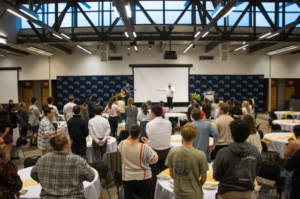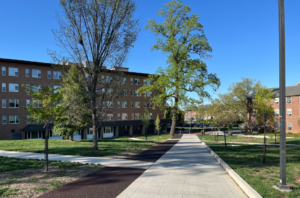March Faculty Assembly Meeting
By Christopher Vitale
The Faculty Assembly (FA), a body of educators on campus distinct from the Academic Senate whose membership represents every school within the University, met this Wednesday for their monthly meeting. Linda Donaldson, chair of the FA, presided over the meeting which focused on discussing the response to a recent Student Government Association (SGA) resolution concerning the FA as well as discussing the Middle States Commission on Higher Education (MSCHE) Accreditation.
To begin the meeting, Donaldson introduced Julia Young of the History Department to share a brief history of the functions of the FA. Young explained that the Assembly was originally founded in 1967 in response to the University’s decision to not reappoint Fr. Charles Curran to his position in the Theology Department. She also noted that it was formed as a way for faculty to discuss their concerns about the university’s leadership.
“[The Faculty Assembly] was also a proponent for advocating for shared governance and faculty involvement in governing the University,” stated Young to illustrate the FA’s foundational mission— one that is still legitimate today.
Young explained that the FA reconvened throughout the 1970’s whenever serious issues required attention and emphasized that the FA, since its reconstitution in May 2018, still explores the same issues as it did in the past such as revisions of curriculum, retention of undergraduate and graduate students, and faculty wellbeing and financial health.
The next item on the agenda was to discuss the recent SGA Resolution 014 regarding the FA. Jimmy Harrington, SGA president, and Aaron Mackisey, the sponsor of Resolution 014, attended the meeting on behalf of the Student Government. Harrington stated that the resolution aimed to provide context about the Faculty Assembly to students who were seeking clarity on the matter.
In response, Claudia Bornholt, Department Chair of Modern Languages and Literature, suggested that a key issue causing confusion about the FA is that it is not a formally recognized body and that, because the faculty have insufficient representation in the University’s governing bodies, the Academic Senate should allow a voting representative from the executive committee of the FA on the Senate.
Dr. Bornholt added that members of the faculty “are somewhat restricted in their ability to freely express themselves.”
Additionally, FA member Melissa Grady, Associate Professor for the National Catholic School of Social Service, encouraged the SGA representatives to understand that where students have the SGA as a place for voicing concern and proposing solutions, the FA operates in a comparable manner for faculty members.
Narrowing in on the specifics of the resolution, which speaks of the FA’s “continued misinformation, malalignment, incorrect implication, and circumvention of the university’s shared governance model,” Young defended the intentions of the faculty group and proposed that it would be beneficial for SGA to seek to sculpt more accurate language in the process of writing resolutions. Grady seconded this notion and called for a more neutral tone within SGA’s portrayal of the FA in writings and official documents.
To further defend the motives of the Assembly, Donaldson maintained that the group’s aim is now and has always been to foster academic freedom and to encourage this freedom to thrive within all university bodies and divisions.
“That kind of language about the Faculty Assembly doesn’t reflect the truth of our history, of who we are, and how we’re trying to work collaboratively with the existing bodies,” Donaldson said.
The FA members subsequently shifted their attention to the matter of the University’s progress in it’s process of renewing MSCHE accreditation. Jim Greene of the Department of Biology, one of two faculty members currently acting as a Middle States evaluator, gave a presentation detailing the accreditation process.
“Catholic University is very fortunate to have been continuously accredited by the Middle States Commision on Higher Education since 1921,” Greene said.
He then explained that despite this accreditation being a regional one, it is nonetheless the most official type available and is responsible for allowing the university to be eligible for millions of dollars worth of federal funding. This is crucial for distributing loans and grants to students in order to make tuition more affordable. The plan laid out for the University to receive renewed accreditation is on track to be completed in 2020 when an evaluation report will be sent to MSCHE regarding assessments made in recent years. All the FA documents, as well as publication of its next meetings, can be found on the Faculty Assembly website.








